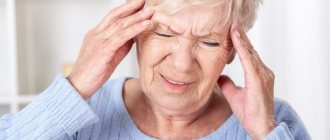Dementia: stages of development, prognosis and life expectancy
Dementia literally means madness in Latin. In the everyday sense, words denoting a decrease in mental abilities and memory - insanity, dementia - are considered synonymous. This is an acquired condition that occurs due to the breakdown of mental functions. The disease is most common in older people.
You can often hear the common expression “senile insanity,” which is also synonymous. Dementia in older people requires timely seeking professional help. Treatment started in the early stages will help correct behavioral abnormalities, saving both the patient and relatives from serious problems.
What it is?
Dementia is acquired dementia, a persistent decline in cognitive activity with a loss to varying degrees of previously acquired knowledge and practical skills and difficulty or impossibility of acquiring new ones.
In contrast to mental retardation (oligophrenia), congenital or acquired dementia in infancy, which is an underdevelopment of the psyche, dementia is a breakdown of mental functions that occurs as a result of brain damage, often in youth as a result of addictive behavior, and most often in old age ( senile dementia; from Latin senilis - senile, old man).
Popularly, senile dementia is called senile dementia.
Severity of dementia in older people and characteristic symptoms
According to experts, symptoms of dementia or sclerosis in older people can manifest themselves differently depending on the characteristics of the body. But it is still possible to name a certain list of manifestations that show that the patient suffers from one or another stage of insanity.
| Stage | Symptoms | Forecast |
| Initial | · Impaired speech functions while maintaining physical and intellectual activity; · short-term memory lapses; · high irritability; Conflicts when communicating with others; · aggressive behavior; · negative attitude towards the world. | If the disease is detected in time, it is possible to stop the process of destruction of brain cells. At the same time, it is very important that a favorable psychological environment reigns in the patient’s home so that he feels the support of his family. |
| Moderate | · Intellectual inhibition, loss of basic skills, inability to remember even simple information; · denial of the rules of life in society; epilepsy attacks; sleep disturbance; · problems with spontaneous speech, use of stereotyped phrases. | Treatment can to some extent stabilize the patient’s condition, but it is almost impossible to achieve positive dynamics. One way or another, over time the disease will progress. |
| Launched | · Absolute insanity, inability to live independently, need for constant assistance; · disruption of the functioning of all organs; · mental seizures; · loss of most memories; · forgetfulness in everyday life; · asceticism. | Dementia in such an advanced form quickly leads to death, since the immune system practically does not function, and all systems in the body work with serious impairments. |
We recommend
“Vitamins for elderly people over 70: which ones are needed first” Read more
Causes
The main cause of the disease lies in disturbances in immune processes, which result in the formation of autoimmune diseases that precede destructive processes in brain cells. There are primary and secondary causes of the development of marasmus in older people, the factors of which determine the intensity and speed of the disease. The primary ones include destructive processes of the cerebral cortex that occur against the background of the progression of concomitant diseases, such as:
- Alzheimer's disease or senile dementia;
- Pick's disease.
Primary causes provoke an acute course of dementia, which requires constant monitoring.
Secondary brain damage is observed against the background of the progression of infectious and viral diseases, pathogenic microorganisms of which can suppress the central nervous system and also weaken the immune system. These include:
- chronic arterial hypertension;
- HIV infection;
- severe intoxication with harmful chemicals;
- infectious diseases of chronic type;
- the presence of inflammatory foci of viral etiology in the body;
- cerebral atherosclerosis; endocrine disorders;
- oncological tumors in the brain;
- autoimmune disorders.
All these diseases form a risk factor for the development of senile dementia
Features of dementia in older people
The older a person is, the slower the regeneration processes of brain cells become, the more difficult it is for them to recover from critical situations. The state of the brain in old age is characterized by a significant decrease in activity, against which a disease of the nervous system called dementia develops.
Marasmus progresses, and gradually irreversible processes are launched in the human body, which significantly affect self-perception and behavior. Symptoms of dementia such as incoherent speech, memory lapses, and unpredictable behavior are widely known. One can name a huge number of manifestations of this disease, which are not just undesirable, but even dangerous for the patient himself. Therefore, people suffering from dementia require constant monitoring.
Sometimes loved ones are sincerely surprised by how their elderly relative behaves: insanity can cause dramatic changes in character for the worse, irritability and aggressiveness. At the same time, a person is not always able to remember his recent action.
Dementia as a mental illness has the following features:
- Sometimes it occurs at an early age, causing severe emotional shock and causing the brain to age prematurely.
- According to statistics, among patients with marasmus there are twice as many women as men. This is due to the peculiarities of the female body, in particular with the greater intensity of nervous reactions.
- This disease is constantly progressing. If it is not detected in time and treatment is not started, changes in the patient’s psyche will become dangerous for others.
- Alcohol and drug use are risk factors that can cause dementia symptoms to appear long before old age.
- The disease manifests itself differently in each person. The speed of its development is influenced by many factors, both external and internal. It is believed that with due attention and care from loved ones, negative manifestations are reduced.
- Marasmus is also hereditary. If one of your ancestors suffered from this disease, then your descendants are more likely to suffer from it.
According to WHO statistics, dementia is diagnosed more and more every year, and the age of patients is decreasing. Now symptoms of marasmus are also detected in people 50-55 years old, although not so long ago it was believed that the average age of the disease was 65 years.
We recommend
“Depression in older people: types, symptoms, prevention” Read more
Types of disease
In medicine, there are 4 types of disease that are associated with the area of the brain in which changes have occurred:
- Cortical – affects the cerebral cortex and can occur simultaneously with frontotemporal dementia. Mainly observed in alcoholism, Pick's and Alzheimer's diseases.
- Multifocal - several foci of pathology are observed in different parts of the central nervous system. Such senile dementia progresses rapidly and causes a range of neurological symptoms.
- Subcortical – a pathology that affects subcortical structures and causes neurological symptoms. A similar thing happens in Parkinson's disease.
- Cortical-subcortical – a mixed lesion caused by vascular changes.
It is customary to distinguish 2 forms of senile dementia:
| Total | associated with the complete collapse of personality. The patient not only loses interest in what is happening, his intellectual abilities are impaired, the emotional-volitional sphere changes dramatically (loss of a sense of shame, interest in life, social maladjustment). Total dementia is associated with damage to the cortex in the frontal part of the brain or the development of tumor processes. |
| Lacunarnaya | has isolated lesions of individual structures that regulate intellectual activity. As the disease progresses, the patient's short-term memory begins to suffer, so he is forced to constantly write down everything. At the same time, the emotional-volitional sphere practically does not suffer. As an example, we can mention the initial stages of Alzheimer's disease. |
There are 3 common types that are characteristic of such a disease as senile dementia:
- Vascular dementia - degeneration of the central nervous system is a secondary factor and occurs against the background of impaired blood circulation in the brain.
- Dementia in Alzheimer's disease (atrophic) is associated with the primary destruction of nerve cells.
- The mixed type of disease is based on both mechanisms of occurrence.
How is dementia treated in older people?
Treatment of dementia inevitably involves taking medications. In this case, three groups of drugs are prescribed:
1. Psychostimulants. Their active ingredients are mesocarba and caffeine. Stimulants are used to make the central nervous system more resistant to psycho-emotional stress.
2. Nootropic medications . Such drugs are prescribed to maintain mental activity and memory, as well as to reduce aggression. Among them:
- Kaviton, glutamic acid, Vasobral, Tanakan - have a positive effect on the metabolism of brain cells.
- Curantil, Retard, Trental and Flexital - improve cerebral circulation.
- Takryl and Memantine - help with Alzheimer's disease.
3. Vitamins and minerals. For symptoms such as increased excitability and depressive disorders, it is recommended to take Mezapam, Finlepsin, Tranxen.
Another important point in the treatment process is the attitude of family members towards the patient. Relatives should treat the problem with understanding and provide psychological comfort to the relative. However, only specialists can provide proper care for older people with symptoms of late-stage dementia.
Symptoms of dementia
Senile dementia begins with mild symptoms that can easily be mistaken for a normal personality change in old age. If you notice the following signs in older adults, you should start to worry.
- Behavioral destruction is characterized by manifestations of sloppiness and carelessness in clothing. Carrying out basic actions regarding personal hygiene requires reminders. Work and usual actions become uninteresting, persistence in proving one’s own rightness and edification develops. In certain situations, the patient is easily suggestible. Indifference also develops in relation to everything that has nothing to do with the patient’s personality. Often shyness disappears, this feeling is replaced by promiscuity, the patient prefers conversations with erotic overtones.
- Memory impairment is caused by organic brain damage. The patient may forget yesterday's events, but remembers long-past events with great detail. The patient may not remember important events, as well as the dates of the current day.
- Thinking deteriorates significantly, habitual daily tasks are solved with great difficulty, and difficulties arise when it is necessary to make a choice in favor of an effective solution to a problem.
- Orientation in time space is disrupted, but only in cases where the patient is in an environment that is unusual for him. At home there are no problems with the sense of time, but in an unfamiliar place it can get lost.
- In the first stages of the disease, a person is characterized by loquaciousness, habitual speech is preserved, as well as facial expressions, gestures and the appropriate use of formulaic expressions. Stereotypical behavior and the use of patterns in communication can cause senile dementia not to be noticed on time. Accidental diagnosis is possible only when the patient is unable to answer a randomly asked question about age, date or time.
Senile dementia in older people provokes the development of stinginess and greed; patients often begin to collect unnecessary things at home in large quantities.
Hypersexuality and excessive appetite characterize the initial stages. Self-care skills are lost as the disease develops, decades disappear from a person’s memory and it seems to him that he is young and does not yet have any grandchildren or children.
Periods of depression, sentimentality, anger or aggression often occur.
Stages of dementia in older people
Diseases associated with changes in brain activity can seriously affect the life of an elderly person. However, the development of such conditions is not always easy to track, and even doctors often cannot correctly diagnose and plan treatment that would help stop the progression of dementia. However, in some cases, it is enough to notice dangerous manifestations in time to detect the problem and begin treatment. To do this, you need to know what the symptoms of dementia are in older people at different stages.
There are three stages of development of marasmus, each of which has its own characteristics:
- At the first stage, the patient’s behavior practically does not differ from the norm. Both physical and intellectual activity are maintained. When the initial degree of insanity occurs, memory and the functioning of the speech apparatus are primarily impaired.
- The second stage is characterized by the fact that an elderly person can no longer, without thinking, perform all the actions he is accustomed to. Even the simplest activities at some point begin to cause him difficulties. At the mental level, symptoms such as anxiety and depression, and sometimes even fainting, occur. Patients often complain of problems with sleep.
- At the third stage of dementia, the elderly person becomes completely inadequate. He cannot take care of himself, observe hygiene standards, or eat food. His memory fails him more and more often, to the point of being unable to remember the events of the current day. The life of such a patient completely depends on the help of relatives and doctors.
Senile dementia
This form of the disease is characterized not by gradual memory loss (mild forgetfulness), but by sharp exacerbations and exaggeration. All the blacks of a person hypertrophy, he becomes boring, greedy, clings to little things, everything around him begins to irritate him.
- The patient looks around, begins to collect garbage and rubbish, and store it at home. A person who used to be purposeful turns into a real stubborn person, insisting on his own contrary to all logic. All this leads to a decrease in intelligence, and social maladaptation occurs.
- In the most severe cases, they completely lose their memory, all their skills and abilities. He cannot talk, pronounce words, eat food on his own, and does not control physiological processes.
The result is complete physiological and psychological insanity. Without regular care within 24 hours, the patient cannot exist.
Stages of dementia development
The stages of the disease are varied and depend on the type of dementia. However, common features can be identified - the classification is based on the severity of the process:
- Mild dementia (initial stage). The onset of the disease is characterized by slight and at first glance curious forgetfulness. People “automatically” close the TV remote control into the refrigerator, and put the key to the intercom to the elevator call button. Then fixation amnesia appears, when new information flies out of the head. Some character traits can become aggravated to the point of absurdity: a thrifty person turns into a plushkin, a purposeful person turns into a stubborn tyrant. With timely correction, it is possible to slow down the processes of destruction of brain cells. The participation of the family is important, which must create favorable microclimatic conditions for the patient, surrounding him with care and love
- Moderate dementia. Events that happened in a more distant period of time are forgotten, while the person remembers childhood and youth. Failures are replaced by fictional episodes, events move in time: the grandfather is going to lecture at the university he graduated from 50 years ago, the “pregnant” grandmother buys diapers. Practical skills are impaired and they cope only with the simplest household chores. Dementia makes people a danger to themselves and others. Difficult to treat, which is aimed at stabilizing the patient’s condition. The prognosis is unfavorable because the disease tends to progress
- Severe dementia. The very last stage. The patient’s symptoms progress, and physical functions are impaired. A person stops recognizing close people. As a result of dementia, the patient experiences complete personality degradation. The prognosis is the most unfavorable. As a result, dementia leads to death, since impaired immune reactions lead to death due to the inability to fully control all processes in the body.
Dementia treatment
Treatment for dementia includes drug support provided by neurologists and psychiatrists, as well as rehabilitation measures (when possible). In general, it is only possible to slow down the progression of the pathology; a fundamental solution to the problem has not been found to date.
Several types of drugs are used for therapy:
- Cholinesterase blockers inhibit the breakdown of acetylcholine, which facilitates nerve transmission in the brain. The drugs help fight memory impairment. These are: Aricept, Razadin, Galantamine, Exelon, Rivastigmine.
- Memantine blocks glutamate, which is an excitatory neurotransmitter of the central nervous system and damages neurocytes.
- Neuroleptics relieve neurotic and psychopathic manifestations of dementia. Droperidol, haloperidol, Aminazine, Propazine, Mazeptil, Thioproperazine, Sonopax, Perferazine, Risperidone, Chlorprothixene, Fluanxol, Klopixol, Clozapine, Sulpiride, Opanzaline.
- Antidepressants from the group of serotonin reuptake inhibitors: Paroxetine, Prozac, Anafanil, Citalopram reduce anxiety and fears.
- Tranquilizers relieve fear, reduce anxiety and emotional tension. At the same time, they do not reduce memory or impair thinking. Most of these drugs relieve vegetative symptoms. Heterocyclic drugs are used: buspirone, Ivadal, Imovan, Zopiclone.
Thus, dementia rarely begins spontaneously. More often, this pathology accumulates symptoms and becomes more severe over time. The tasks of the patient’s relatives include promptly showing the person to a specialist neurologist or psychiatrist.
Dementia - how to behave with a person?
First of all, have a positive attitude when communicating with your sick relative. Speak only in a polite, pleasant tone, but at the same time clearly and confidently. When starting a conversation, attract the patient's attention with his name. Always formulate your thoughts clearly, expressing them clearly in simple words. Always speak slowly and in an encouraging tone. Clearly ask simple questions that require clear answers: yes, no.
For difficult questions, give a hint. Be patient with the patient, give him the opportunity to think. Repeat the question if necessary. Try to help your relative remember a specific date, time, and names of relatives. It is very difficult to be understanding. Do not react to reproaches and reproaches. Praise the patient, take care of the consistency of his daily routine. Break down any activity into steps. Reminisce about the good old days with the patient. It's calming. Good nutrition, drinking regimen, and regular movement are important.
Research Facts
One 2013 study from the Nizam Institute of Medical Sciences in India found that speaking two languages may delay the development of dementia. An analysis of medical records from 648 cases of dementia found that those who speak two languages develop dementia an average of 4.5 years later than those who speak only one language.
Recently, studies have appeared indicating a slight decrease in the percentage of people suffering from dementia in the total number of elderly people in developed countries. So, if in 2000, 11.6 percent of people over 65 in the United States had dementia, then in 2012 there were much fewer of them: 8.8 percent.
There are 16 scientific studies demonstrating the effect of phosphatidylserine on reducing symptoms of dementia or cognitive impairment[5]. In May 2003, the US Food and Drug Administration (FDA) approved a Qualified Health Claim for phosphatidylserine, allowing US manufacturers to state on their labels that “Consumption of phosphatidylserine may reduce the risk of dementia and cognitive impairment in older adults.”
However, this statement must for now be accompanied by the caveat that “very limited and preliminary scientific research suggests that phosphatidylserine may reduce the risk of cognitive dysfunction in older adults,” since the Agency considered that the scientific community is still divided on this topic, and the majority The studies were done using phosphatidylserine derived from cow brain rather than the soy phosphatidylserine that is currently used.
Can dementia be prevented?
What are the risk factors for developing dementia? Does smoking cause or protect against dementia? What advice can you give to patients who would like to reduce their risk of dementia?
| Figure 1. Can lifestyle choices reduce the risk of dementia? |
The recent presentation of new drugs against dementia has attracted close public attention.
However, existing treatment with drugs of the previous generation, similar in action to the new ones, provides only limited relief of symptoms, sometimes slowing the progression of dementia over the course of a year. So there is currently no known drug that can stop the progression of dementia or prevent cognitive decline in old age. This, however, does not stop patients from seeking new information about ways to prevent dementia. Many people realize that medical breakthroughs are rare, and good health in old age is often attributed to a healthy lifestyle. Patients ask whether they can reduce their risk of developing dementia through certain lifestyle choices.
The purpose of this brief review is to examine the biological support for some useful recommendations.
In the absence of well-controlled randomized trials, there is no adequate basis for definitive conclusions. Epidemiological studies suggest that, as with heart disease, there are treatments that can be easily done at home that reduce the risk of dementia in old age, alone or in combination with other diseases.
The main risk factors for developing dementia in old age are: age over 75 years, female gender, diabetes, stroke, head injury, family history of dementia and/or Down syndrome, and possibly a history of depressive disorders.
As a rule, dementia in old age develops gradually, and about six years pass from its first manifestation to the death of the patient. The duration of any presymptomatic stage is difficult to determine, but according to some neurophysiological studies [1], the changes characteristic of Alzheimer's disease begin in the fourth decade of life. These symptoms gradually accumulate, causing the death of brain cells in areas responsible for memory function. Over time, the hypothetical symptom threshold is exceeded and signs of dementia appear.
On the contrary, neuroradiological studies show that brain volumes are well preserved in old age until there is a threat of dementia, which is presumably associated with a catastrophic decrease in the brain regions of neurons responsible for memory.
Preventive measures do not seem to work if the process of dementia has already begun. If the data from neuropathological studies, according to which senile dementia begins in middle age, are correct, then it makes sense to prevent dementia at the age of 40–50 years. However, if the onset of brain decline in old age is correctly established neuroradiologically, then preventive measures can be successful even in very elderly people without dementia.
An important component of neuronal degeneration is the age-related predominance of neuronal damage processes over the brain’s own reparative processes (the “wear and tear” hypothesis). Ways are being developed to implement neuroprotective strategies to support neurons during midlife and old age.
- Cerebrovascular diseases
It has not yet been proven that cerebrovascular disorders lead to a decrease in mental abilities in old age. Dementia often begins after a stroke; This may be a common mechanism for the development of vascular dementia. Cerebrovascular changes alone or in combination with Alzheimer's disease are likely responsible for 25-50% of all late-onset dementias. Risk factors for cerebrovascular diseases are well known (hypertension, smoking, obesity, hyperlipidemia, family history of stroke, diabetes, unbalanced diet). Addressing such factors clearly reduces the risk of stroke/vascular dementia in older adults [3] and may have beneficial effects in patients with already impaired cognitive function [4].
Correction of hypertension does not lead to a deterioration in mental performance even in people with cognitive impairment (hypertension is not inherent in the old brain), therefore, there is reason to control even a moderate increase in blood pressure in older people [5].
- Diabetes
The vascular complications associated with diabetes are well known, so it is not surprising that there is a link between diabetes and dementia. Neuropsychological studies reveal deficits in unstable, insulin-dependent diabetes, possibly due to mechanisms of damage to the vascular endothelium. The Rochester Registration Sheet provides a highly accurate estimate of the increased risk of developing Alzheimer's disease with adult-onset diabetes (relative risk 2.3% for men, 1.4% for women).
Treating diabetes in old age reduces the risk of developing vascular dementia and possibly Alzheimer's disease. A special diet, dosed exercise, oral hypoglycemic agents and insulin provide effective treatment. Any program to prevent dementia should include the identification and treatment of patients with unrecognized diabetes who should achieve recovery of cognitive function as a result of therapeutic intervention.
Hormone replacement therapy (HRT). There are age-dependent changes in the hormonal regulation of glucose metabolism, which may be associated with changes in insulin sensitivity and increased production of growth hormone.
In addition, estrogen production in women is significantly reduced. The beneficial effects of estrogen replacement therapy include a reduced risk of osteoporosis, coronary artery disease, stroke, and even Alzheimer's disease.
| Figure 2. Possible strategies to prevent dementia |
Some early studies supported the use of estrogens in older women with dementia, even before it was established that the use of estrogens during periods of increased risk of developing Alzheimer's disease significantly reduces the likelihood of developing Alzheimer's disease [7, 8].
Currently, the effectiveness of HRT in the treatment of already developed Alzheimer's disease is being tested, and large-scale studies are being conducted in elderly women who have undergone HRT, including those who have found a decline in mental abilities as a result of treatment. Thus, it is too early to talk about improving mental processes as a potential effect of HRT along with the prevention of osteoporosis and vascular diseases.
- Smoking
Smoking is an undoubted risk factor when it comes to the development of a number of diseases in old age, including cancer and atherosclerosis. The latter increases the risk of developing vascular dementia and cognitive disorders in old age due to increased atherosclerosis and worsening hemodynamic processes.
However, some studies indicate a possible reduction in the risk of developing Alzheimer's disease with smoking in old age. A small number of clinical studies on the use of nicotine or its agonists also support the positive effect of nicotine in the treatment of Alzheimer's disease and allow smoking to be considered as a protective factor in dementia.
A large-scale study known as the Honolulu Heart Program [9], involving 3429 Japanese and American subjects, found a positive correlation between smoking in midlife and the risk of cognitive decline in later life. In this group, long-term abstinence from smoking had a beneficial effect on mental processes.
- Nutrition
Pathological mechanisms of Alzheimer's disease may include oxidative stress and the accumulation of free radicals, which, in turn, can lead to excessive lipid peroxidation, disruption of the integrity of neuronal membranes and gradual death of brain cells.
Research into nutritional factors has found a link between diet and cognitive decline in old age. At the same time, the subjects kept so-called “food diaries”, in addition, they had measurements of the concentration of micronutrients in the blood. Factors such as poverty and smoking are associated with an increased risk of stroke, which may explain increased aging of the brain and destruction of endothelial membranes.
Cerebrovascular disease is associated with an increased risk of strokes and vascular dementia. Diet can help prevent these diseases, although, of course, it is often difficult to separate “healthy eating” from “healthy lifestyle.”
However, the fact that different studies (food diaries and changes in plasma concentrations of substances) led to largely the same conclusions suggests the important role of diet in preventing the deterioration of mental processes and, possibly, dementia. W. Gilman et al found that when lifestyle factors were taken into account, eating fruits and vegetables reduced the risk of stroke.
Similarly, R. Gale et al studied the relationship between cause of death, cognitive function in old age and certain living conditions, including diet. They concluded that cerebrovascular disease is not the last cause of mental impairment in old age, and vitamin C intake “may protect against both mental impairment and cerebrovascular disorders.”
The concentration of antioxidants in blood plasma largely predicts the preservation of cognitive function in old age. This is evidenced by data from a 22-year study of patients' lifestyles. Eating vitamin C and beta-carotene, found in fruits and vegetables, and alpha-tocopherol (vitamin E) was associated with cognitive test performance in older adults.
High dietary intake of polyunsaturated fatty acids (such as linoleic acid) or insufficient intake of antioxidants can cause oxidative stress and predispose to atherosclerosis. In a study of 390 very old people between 1990 and 1993, these factors were found to increase the risk of cognitive decline.
In addition, a link has been found between increased intake of linoleic acid and decreased mental performance. An inverse relationship has been found between fish consumption and cognitive decline, although antioxidants (vitamins A, C and E) have not been shown to have any protective effect on cognitive function.
Another epidemiological study of 137 older adults provided further evidence of the role of diet in preventing cognitive decline in old age, but did not isolate the same micronutrients. High past intakes of vitamins A, C and E were associated with better performance on specific neurophysiological tests.
There is also evidence from one randomized trial that examined the effects of vitamin E supplementation (2000 IU/day) in the treatment of Alzheimer's disease. Before treatment, there were no differences between the control and treatment groups, but a course of vitamin E was enough to slow the progression of dementia by an average of eight months.
- Nonsteroidal anti-inflammatory drugs
A connection has been established between cerebrovascular diseases and decreased thinking abilities, so it is advisable to use aspirin to prevent dementia. The antiaggregation properties of aspirin prevent transient ischemic attacks and thrombosis by affecting the mechanisms involved in the prevention of vascular dementia.
The East Boston Elderly Health Project conducted a study of 3,809 people. It made it possible to prove that as a result of the administration of aspirin, there is some improvement in cognitive function. It has been suggested that if aspirin is used at higher anti-inflammatory doses rather than at low antithrombotic doses, the drug's effect on improving cognitive function is increased.
Epidemiological studies indicate that chronic use of non-steroidal anti-inflammatory drugs reduces the risk of cognitive impairment in old age. Indomethacin improves short-term memory in healthy older adults, according to one clinical study.
Table 2. Neural protective factors and dementia
Risk Reduction
Putative neuroprotective agents
|
R. Rozzini et al (1996) found a similar relationship when studying data from epidemiological studies of older people from various population groups (Established Populations for Epidemiological Studies of the Elderly - EPESE). Selection was made based on age, gender, education, presence of cerebrovascular diseases and hypertension. The relative risk of developing Alzheimer's disease was found to be lower among those who chronically take NSAIDs (relative risk was 0.82).
Scientists who conducted a study in a group of elderly people in Baltimore associated a reduced risk of developing Alzheimer's disease with increased use of NSAIDs. It's time to conduct a massive study of preventive measures to combat risk factors for cerebrovascular disease, as well as the possibilities of NSAIDs and some other drugs, such as hormones and nutritional supplements.
Testing of cognitive function should be routine in the clinical assessment of the elderly patient, regardless of whether cognitive function is impaired or not. If a violation is detected, the most likely cause is determined and appropriate medications are prescribed.
The latter may include anti-dementia drugs (donepezil is the most widely available in the UK, with other similar drugs due to be available soon), but more often than not, simpler drug adjustments are required.
Some patients report a subjective feeling of impaired cognitive function or are overly concerned about the possibility of developing dementia due to older age or the fact that a close relative has dementia. Factors that increase the risk of developing dementia have been described in many studies.
In such cases, it is advisable to give the patient some advice. Firstly, it is necessary to constantly monitor the condition of the blood vessels and, if vascular risk factors are detected, carry out treatment. Secondly, in the absence of contraindications, the possibility of HRT is considered in all elderly patients. The benefits of HRT are greater than the risk of adverse effects, so there is currently no compelling reason to avoid this method in older women at risk of developing dementia.
Thirdly, all patients need counseling regarding proper nutrition, even if the patient’s diet is obviously of high quality. In old age, due to the increasing need of the aging brain for reparative substances, a deficiency of micronutrients (antioxidants, w-3 fatty acids) develops.
Finally, you should consider NSAIDs. Aspirin (at doses that achieve anti-inflammatory activity) and other NSAIDs, when well tolerated, have the potential to reduce the risk of dementia.
References
1.
Braak H., Braak E. Staging of AD's related neurofibrillary changes // Neurobiology of Aging l995;
16(3): 271-278. 2.
Fox NC, Freeborough PA, Rossor MN Visualization and quantification of rate of atrophy in Alzheimer's disease // Lancet 1961M8 (9080): 82-30.
3.
Hachinski V. Preventable senility: A call for action against the vascular dementias // Lancet 1992;
340:645-647. 4.
Starr JM, Whalley LJ, Deary IJ The effects of anti-hypertensive treatment on cognitive function;
results from the Hope study // J. Am Geriat Sac 1996; 44:41 1-415. 5.
Prince MJ, Birt AS, Blizzard RA et id.
Is the cognitive function of older patients affected by antihypertensive treatment? Results from 54 months of the Medical Research Council's treatment trial of hypertension in older adults // BMJ 1996; 312:801-803. 6.
Leibson CL, Rocca WA, Hanson VA et al Risk of dementia among persons with diabetes mellitus: a population-based cohort study // Amer.
J. Epidemiol. 1997; 145(4): 301-308. 7.
Bonn D. Oestrogen offers protection in Alzheimer's Disease // Lancet 1997;
349: 1889. 8.
Tang MX, Jacobs D, Stern Y et al.
Effect of estrogen during menopause on risk and age at onset of Alzheimer's Disease // Lancet 1996; 348: 429-432. 9. Galanis DJ, Petrovitch H., Launer LJ et al. Smoking history and middle age and subsequent cognitive performance in elderly Japanese-American men. The Honolulu-Asia Aging Study // Amer. J. Epidemiol. 1997; 145(6): 507-515.
Prevention
To prevent senile dementia, physical activity is necessary. This allows you to prevent the disease from developing for a long time. Such loads should not be exhausting. It is worth using walks in the fresh air, morning exercises, and gymnastics. Such activity also helps prevent obesity.
You need to train not only the body, but also the brain. The death of brain cells is excluded with constant mental activity. It increases the effectiveness of treatment and prevention.
According to statistics, people with higher education and constantly engaged in mental activity are 4 times less likely to develop senile dementia than other elderly patients. A person does not have to solve complex problems; he can limit himself to solving crossword puzzles and reading. This lifestyle will not only help preserve long-term memory, but also expand your interests and horizons.
It is very important to get rid of bad habits. Regular consumption of alcoholic beverages can trigger the development of senile dementia. In this case, symptoms of the disease can be noticed by the age of 40.
Preventing dementia in older people
It is impossible to completely get rid of dementia. But it is still necessary to treat it, since taking medications helps to significantly slow down the development of the disease and provide the patient with a better quality of life.
Preventive measures that reduce the likelihood of insanity include:
- Physical activity: physical exercise improves blood flow to the brain.
- No bad habits. Tobacco and alcohol negatively affect overall health and can lead to stroke.
- Proper nutrition and hardening. Eating foods rich in vitamins strengthens blood vessels, and hardening helps strengthen the immune system.
- Intellectual activity. The more the brain works, the better condition it will remain in old age. Any type of mental activity is suitable: reading, learning languages and even crosswords. All this helps to preserve connections between neurons and prevent the occurrence of degenerative processes in the cerebral cortex.
But you still need to understand: no matter how high-quality the treatment is, sooner or later the disease will take its toll. Over time, the symptoms of dementia in older people become more and more pronounced: adequate perception is lost, motor activity decreases, and the intellect stops working. Patients with this diagnosis die quite quickly.
When dementia first begins to develop, people usually notice warning signs themselves, but few talk about it. And yet, it is extremely important to detect the pathology in time, since only timely treatment and support from loved ones can alleviate the condition of an elderly person with such a diagnosis.
And although there is no way to cure dementia forever, the patient’s relatives should do everything possible to ensure that he lives as calmly as possible in his last years.
Prognosis for dementia
Patients with dementia are poorly trained, it is difficult to interest them in new things in order to somehow compensate for lost skills. When treating, it is important to understand that this is an irreversible disease, that is, incurable. Therefore, the question arises about the patient’s adaptation to life, as well as quality care for him. Many devote a certain period of time to caring for the sick, look for caregivers, and quit their jobs.
Dementia is not an independent disease and is often a phenomenon of the underlying illness. Patients are able to lose knowledge about themselves, forget themselves, become just a shell without content, stop practicing basic hygiene and lose the ability to consciously eat. The disease may not progress if it is caused by a traumatic brain injury. People with alcoholic dementia sometimes feel better after stopping drinking alcohol.
How is dementia diagnosed in older people?
As already mentioned, the clinical picture of dementia is not always the same. In order to timely diagnose this disease in an elderly person, doctors use a system of criteria developed by specialists from the World Health Organization.
The main signs of the development of dementia are the following:
- memory;
- intelligence;
- planning skills;
- visual and auditory perception;
- work of the speech apparatus;
- the ability to act in a certain way to achieve certain goals, including loss of everyday skills;
- adaptation to living conditions in society.
At the same time, the patient’s consciousness in most cases continues to function. Diagnostic methods for suspected dementia include cerebrospinal fluid examination, MRI, and positron emission tomography.










